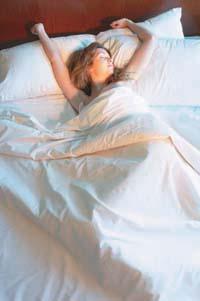Eat and sleep fat or sleep so as not to get fat?

Sleep is not a passive situation. For example, scientists have shown that it greatly influences learning and memory. In addition, sleep influences many physiological functions, but they still have much to research in this field.
However, it is clear that not getting enough sleep can have serious consequences. It is well demonstrated that acute lack of sleep affects both intelligence and attention; for example, lack of sleep is one of the main causes of many accidents on the road or at work.
However, until a few years ago it has not been investigated how the lack of sleep influences, although not so large, when it is chronic. And this type of sleep deficit is much more common than acute. That is, it is much more common than spending the night without sleep or doing very few hours, stealing a few hours to sleep every night and giving it to read, to work, to watch TV or to navigate the computer.
Less sleep, more obesity

On average, in developed countries people sleep two hours less than 50 years ago. In the same period of time, obesity has become one of the biggest health problems. Chance? It is possible, but according to epidemiological studies jointly analyzed both parameters, there seems to be a certain relationship between sleeping little and having more kilos, both in adults and children.
For example, in a study conducted in France with 1,031 5-year-old children, they saw that children who slept less than 11 hours were much more obese than others. In Japan, with 8,274 children between 6 and 7 years old, there were three times more obese among those who slept 8 hours than among those who did 10 hours. In adults, similar results have also been obtained in research such as the US, Switzerland or Spain.
Seeking explanations

To explain the relationship between both parameters there are simple reasons. One may be that the obese sleep badly, that is, the excess of kilos makes them fall asleep little, not the other way around. Another reason is that the time you do not sleep is given to eat and therefore fattening. However, not everything is so simple: those who have studied how sleep affects hunger are clear that there are biological mechanisms between them.
One of them is Eve van Cauter, from the University of Chicago. In the university laboratory, he has conducted detailed studies on the influence of sleep on metabolism and hormone concentration. For example, an investigation forced 12 young men to sleep two nights in a row and to sleep nine hours in another two nights. During the experiment, he measured the concentrations of various hormones, including leptin (saturation signal) and ghrelin (hunger signal), comparing the results obtained in both situations.
After two oversleep nights, leptin levels were 18% lower than normal and greline levels were 28% higher. In addition, the men indicated that they were hungry and that they especially wanted to eat foods rich in simple carbohydrates, such as cookies and pastries.
In other studies, in addition to hormones, changes in the nervous system have also been detected, and in mouse research similar results have been obtained. Therefore, in addition to eating less and practicing more sport, doctors will prescribe patients who have to lose weight: getting enough sleep each night. Isn't it bad, isn't it?
Published in Deia.
Buletina
Bidali zure helbide elektronikoa eta jaso asteroko buletina zure sarrera-ontzian











